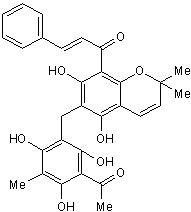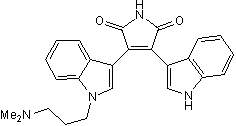PKC delta Products
Protein Kinase C (PKC) delta is a member of the PKC family of serine/threonine protein kinases. It is 676 amino acids (aa) in length with a predicted molecular mass of 77 kDa. Human PKC delta shares 91% and 90% aa sequence identity with the mouse and rat orthologs, respectively. It is composed of two subunits, a regulatory subunit (aa 1-329) and a catalytic subunit (aa 330-676). The novel PKC isoforms, which includes PKC delta, are calcium-independent but are regulated by phosphatidylserine, diacylglycerol (DAG), or exogenous phorbol esters. PKC delta promotes apoptosis in response to DNA damage, whereupon it is constitutively activated by Caspase 3-mediated cleavage of the regulatory subunit. PKC delta can also have anti-apoptotic effects in response to cytokine-induced apoptosis. A second, anti-apoptotic PKC delta splice variant has been identified that is resistant to caspase cleavage. In addition to mediating apoptosis, PKC delta negatively regulates platelet filopodia formation and may decrease platelet aggregation and thrombus formation. PKC delta is overexpressed in several cancers where it regulates cell cycle progression and apoptosis.
18 results for "PKC delta" in Products
18 results for "PKC delta" in Products
PKC delta Products
Protein Kinase C (PKC) delta is a member of the PKC family of serine/threonine protein kinases. It is 676 amino acids (aa) in length with a predicted molecular mass of 77 kDa. Human PKC delta shares 91% and 90% aa sequence identity with the mouse and rat orthologs, respectively. It is composed of two subunits, a regulatory subunit (aa 1-329) and a catalytic subunit (aa 330-676). The novel PKC isoforms, which includes PKC delta, are calcium-independent but are regulated by phosphatidylserine, diacylglycerol (DAG), or exogenous phorbol esters. PKC delta promotes apoptosis in response to DNA damage, whereupon it is constitutively activated by Caspase 3-mediated cleavage of the regulatory subunit. PKC delta can also have anti-apoptotic effects in response to cytokine-induced apoptosis. A second, anti-apoptotic PKC delta splice variant has been identified that is resistant to caspase cleavage. In addition to mediating apoptosis, PKC delta negatively regulates platelet filopodia formation and may decrease platelet aggregation and thrombus formation. PKC delta is overexpressed in several cancers where it regulates cell cycle progression and apoptosis.
| Reactivity: | Human |
| Details: | Sheep IgG Polyclonal |
| Applications: | WB |
Recombinant Monoclonal Antibody
| Reactivity: | Human, Mouse, Rat |
| Details: | Rabbit IgG Monoclonal Clone #7I5U6 |
| Applications: | IHC, WB, ICC/IF |
| Reactivity: | Human |
| Details: | Rabbit IgG Polyclonal |
| Applications: | IHC, WB, ICC/IF |
| Reactivity: | Human |
| Details: | Rabbit IgG Polyclonal |
| Applications: | IHC, WB, ICC/IF |
| Source: | Sf 9 (baculovirus) |
| Accession #: | NM_006254 |
| Applications: | BA |
| Reactivity: | Human |
| Details: | Mouse IgG2a Kappa Monoclonal Clone #2E12 |
| Applications: | WB, ELISA, ICC/IF |
| Reactivity: | Human, Mouse |
| Details: | Rabbit IgG Polyclonal |
| Applications: | WB |
| Reactivity: | Human, Rat |
| Details: | Rabbit IgG Polyclonal |
| Applications: | IHC, WB |
| Applications: | AC |
| Applications: | ELISA |
| Applications: | ELISA |
| Reactivity: | Human |
| Details: | Rabbit IgG Polyclonal |
| Applications: | WB |
| Applications: | AC |
| Reactivity: | Human |
| Details: | Mouse IgG2a Kappa Monoclonal Clone #2G12 |
| Applications: | WB, ELISA |
| Applications: | WB |
| Applications: | WB |
Reported PKCδ inhibitor
| Chemical Name: | 3'-[(8-Cinnamoyl-5,7-dihydroxy-2,2-dimethyl-2H-1-benzopyran-6-yl)methyl]-2',4',6'-trihydroxy-5'-methylacetophenone |
| Purity: | ≥95% (HPLC) |
Protein kinase C inhibitor
| Alternate Names: | Gö 6850,Bisindolylmaleimide I |
| Chemical Name: | 2-[1-(3-Dimethylaminopropyl)indol-3-yl]-3-(indol-3-yl) maleimide |
| Purity: | ≥98% (HPLC) |

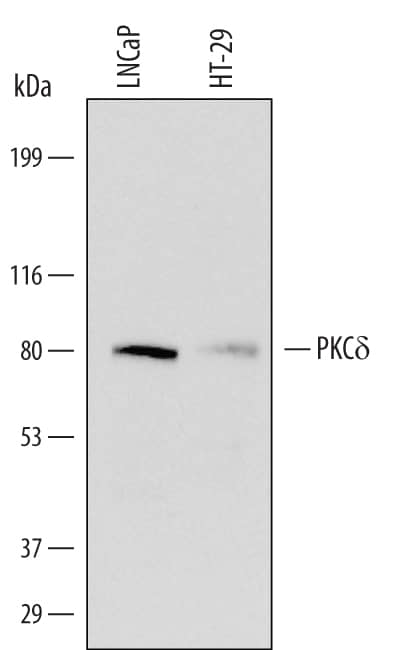

![Western Blot: PKC delta Antibody (7I5U6) [NBP3-16660] Western Blot: PKC delta Antibody (7I5U6) [NBP3-16660]](https://resources.bio-techne.com/images/products/PKC-delta-Antibody-7I5U6-Western-Blot-NBP3-16660-img0004.jpg)
![Western Blot: PKC delta Antibody [NBP1-90957] Western Blot: PKC delta Antibody [NBP1-90957]](https://resources.bio-techne.com/images/products/PKC-delta-Antibody-Western-Blot-NBP1-90957-img0004.jpg)
![Western Blot: PKC delta Antibody [NBP1-90351] Western Blot: PKC delta Antibody [NBP1-90351]](https://resources.bio-techne.com/images/products/PKC-delta-Antibody-Western-Blot-NBP1-90351-img0011.jpg)
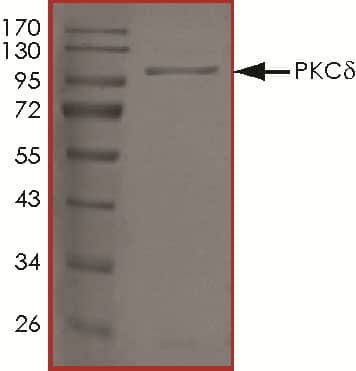
![Western Blot: PKC delta Antibody (2E12) [H00005580-M06] Western Blot: PKC delta Antibody (2E12) [H00005580-M06]](https://resources.bio-techne.com/images/products/PKC-delta-Antibody-2E12-Western-Blot-H00005580-M06-img0001.jpg)
![Western Blot: PKC delta [p Tyr311] AntibodyBSA Free [NBP3-05431] Western Blot: PKC delta [p Tyr311] AntibodyBSA Free [NBP3-05431]](https://resources.bio-techne.com/images/products/PKC-delta-[p-Tyr311]-Antibody-Western-Blot-NBP3-05431-img0001.jpg)
![Immunohistochemistry-Paraffin: PKC delta [p Ser645] Antibody [NB100-82141] -](https://resources.bio-techne.com/images/products/PKC-delta-[p-Ser645]-Antibody-Immunohistochemistry-Paraffin-NB100-82141-img0005.jpg)
![ELISA: Human PKC delta ELISA Kit (Colorimetric) [NBP3-39039] Human PKC delta ELISA Kit (Colorimetric)](https://resources.bio-techne.com/images/products/nbp3-39039_human-pkc-delta-elisa-kit-colorimetric-2110202415384013.png)
![ELISA: Human PKC delta - Ready-To-Use ELISA Kit (Colorimetric) [NBP3-39040] Human PKC delta - Ready-To-Use ELISA Kit (Colorimetric)](https://resources.bio-techne.com/images/products/nbp3-39040_human-pkc-delta-ready-to-use-elisa-kit-colorimetric-2110202415295646.png)
![Western Blot: PKC delta [p Thr505] AntibodyAzide and BSA Free [NBP3-05450] Western Blot: PKC delta [p Thr505] AntibodyAzide and BSA Free [NBP3-05450]](https://resources.bio-techne.com/images/products/PKC-delta-[p-Thr505]-Antibody-Western-Blot-NBP3-05450-img0001.jpg)
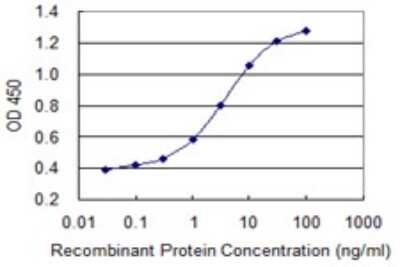
![Western Blot: PKC delta Overexpression Lysate [NBL1-14771] Western Blot: PKC delta Overexpression Lysate [NBL1-14771]](https://resources.bio-techne.com/images/products/PKC-delta-Overexpression-Lysate-Adult-Normal-Western-Blot-NBL1-14771-img0002.jpg)
![Western Blot: PKC delta Overexpression Lysate [NBP2-11306] Western Blot: PKC delta Overexpression Lysate [NBP2-11306]](https://resources.bio-techne.com/images/products/PKC-delta-Overexpression-Lysate-Adult-Normal-Western-Blot-NBP2-11306-img0001.jpg)

